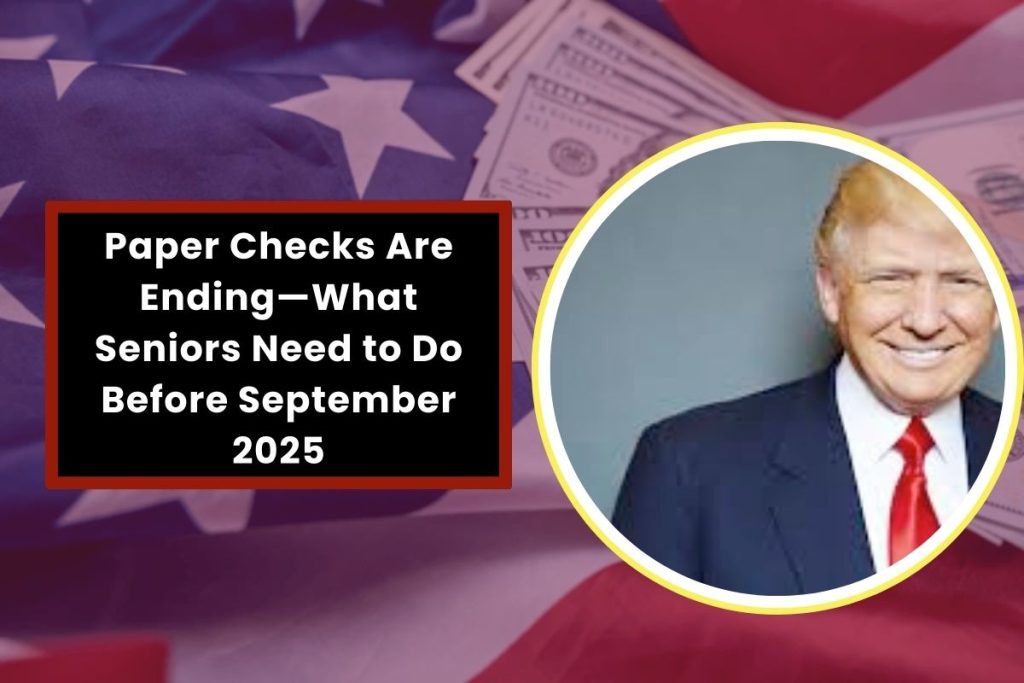Major update coming in regards to Paper checks, which are phased out after September 2025, and people won’t be able to get their Social Security or other government benefits by paper check anymore. If you’re one of the individuals who still get that familiar envelope in the mailbox each month, this change is probably going to feel like a bit of an upgradation. It’s not just some rumour circulating around, but the Treasury Department is phasing out paper checks completely. Reason stated for this is that the method is slower, more expensive, and not as safe as doing disbursement digitally. SSA (Social Security Administration) has been pushing people toward direct deposit and prepaid debit cards for a while now, and this is the final step.
If somebody is not convenient with online banking or electronic payments, the there is nothing to panic about because there are many who feel the same way. After using checks for the whole life, switching now is not comfortable. But the change is coming whether we like it or not, so here’s what you need to know and what you can do right now to avoid any mess when September rolls around next year.
Why Paper Checks Are Coming to End in 2025
For a very long now, paper-checks have been a part of retired individuals’ lives wherein they receive their benefits, but changing times have out-dated that too. One of the biggest reasons of phasing out paper checks is their cost, which is quite high. Expenses of performing the procedure manually are higher in the times of digital era, where paperwork needs printing, processing, and transportation. In contrast, electronic payments are faster, cheaper, and require fewer resources. Security is another big factor. Paper checks can get lost, stolen, or delayed in the mail. They’re also easier targets for fraud. With direct deposit or prepaid debit cards, payments go straight to the recipient, cutting out a lot of risk.
There’s also the issue of convenience because retired personnel will no longer need to visit banks manually to have the issues resolved. It gets more bothering when one is sick or outside somewhere, or not able to leave home due to old age.
$3,000 Bitcoin ATM Operator Byte Federal Data Breach Class Action Settlement
Another prominent reason is associated with the reduction of errors and corruption in the government departments, where manually handling of papers leads to maladministration, delays, and glitches. Shifting away from the checks is going digital, which enables a system that works smooth and effective for everyone.
Paper Checks Ending in SSA 2025 : Overview
| Nation | USA |
| Topic | Phasing out of Paper Checks |
| Deadline | September 2025 |
| Authority | SSA (Social Security Administration) |
| Concerned individuals | Retirees without banking details |
| Estimated strength | 500,000 individuals (nearly 1%) |
| Domain | Finance |

Key Actions Seniors Should Take Now Regarding Paper Checks
Getting ready before the September 2025 cut-offinvolves several simple but essential steps:
Go With Direct Deposit – This is the most common route of receiving payments in the prevailing times. If you already have a checking or savings account, you can have your Social Security or other payments sent straight there each month. It usually lands on time (sometimes even early), and there is no worry about lost checks or trips to the bank. To set it up, the concerned bank’s routing number and your account number are needed. You can call Social Security, go online, or even ask someone at your bank to help walk you through it. It’s not hard, just a bit unfamiliar if you’ve never done it.
Have a Bank or Credit Union Account – There are several individuals who are still depending on checks and cash for their transactions without having any proper bank account. It is high time for them to have a bank account opened. Several banks offer accounts with bare minimum charges and no annual fees for seniors, which is a plus point. Many credits unions that operate on a community basis provides financial services to the local elderly, which can also be used to get connected with mainstream financial and electronic banking.
Consider Prepaid Debit Cards in the Case Bank Access Isn’t an Option – For seniors who face barriers to conventional banking, such as poor credit history or high minimum deposits, government-supported prepaid debit cards can serve as a substitute. Agencies like the U.S. Department of the Treasury’s Bureau of the Fiscal Service offer card-based disbursements for those without a bank account. Do carefully check the associated fees and read the terms.
Confirm Your Payment Transition – After setting up your electronic option, double-check that it’s active. Contact the issuing agency or use its online portal to make sure your payment method has switched successfully. It’s a good idea to request a confirmation letter or printout to avoid futuristic conflicts.
Keep Your Information Updated – in the case one has moved to new address, bank account is changed or contact details are switched, it is to be notified to your benefits provider immediately. As late as it will be done, payments will get delayed by that duration. Confirm whether these updates are accepted via phone, mail, or online, especially as older paper-based processes wind down.
Recognize the Signs of a Missed Payment – Once September 2025 arrives, paper checks will no longer arrive by mail. If your funds don’t appear in your account as expected, contact your provider right away rather than assuming it’s just late. Many agencies are implementing faster electronic processing, so acting promptly can resolve issues quickly.
How Phasing out Paper Checks Affects Everyday Life
The shift to digital disbursements, whether into traditional bank accounts or onto prepaid cards, brings multiple benefits. Payments arrive more predictably, and lost or stolen mail is no longer a concern. There is now a factor of learning that would push the elderly to get insight about the way electronic banking works. Many haven’t used ATMs or digital banking facilities, which were perhaps due to negligence, or they never needed them. But now, since it has become a new norm, assistance from family, friends, and other acquaintances can be taken. Banking personnel will assist in setting up account and desired profile if one chooses so. In this sense, there are several means to get help.
What’s Next After Ending Paper Checks
With the September 2025 deadline looming, take these steps now to guarantee continued financial security:
- Set up direct deposit or another electronic acceptance channel
- Confirm that your enrolment is active
- Update details as needed to prevent interruption
- Be attentive regarding any missed payments and act fast if they don’t arrive
Frequently Asked Questions
1. When do paper checks actually end?
Paper checks for federal benefit payments, including Social Security, SSI, VA benefits, tax refunds, and more, will no longer be issued after September 30, 2025. This decision comes in the wake of events when DOGE is working on efficiency and the eradication of corrupt practices. Previously, SSA has flagged many beneficiaries for receiving higher benefits than they were entitled to.
2. Who will be affected by the ending of Paper Checks for SS Payouts?
Only a small group less than 1% of recipients which stands at roughly 500,000 seniors still receive their benefits by paper check. They will have to switch to other means, such as formal banking, to get their payouts.
3. Why is this change to Paper Checks happening now?
Security issues are major, given that paper checks are 16 times more likely to be lost, stolen, or tampered with compared to digital payments. Another reason is the cutting cost, which in cutting paper checks is significantly more than electronic alternatives. It is said that up to $750 million annually could be saved.
| NLR News | Click Here |

Hello! I’m Kaylani , a professional content writer with a knack for breathing life into words. I have been providing high-quality, research-driven content in Sectors like Technology & Personal Finance . With a background in Finance Tech Management , I specialize in turning complex information into engaging content that resonates with a wide.
